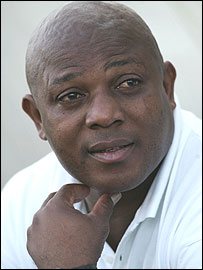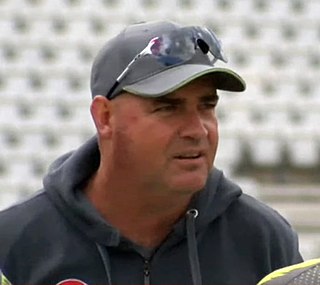A Quote by Stephen Keshi
I felt sorry for Senzo Meyiwa family and for the people of South Africa because it's a shame we lost such a huge talent. In all the games he had played I think he didn't concede any goal.
Related Quotes
At the outset, I want to say that the suggestion that the struggle in South Africa is under the influence of foreigners or communists is wholly incorrect. I have done whatever I did because of my experience in South Africa and my own proudly felt African background, and not because of what any outsider might have said.
When I was in government, the South African economy was growing at 4.5% - 5%. But then came the global financial crisis of 2008/2009, and so the global economy shrunk. That hit South Africa very hard, because then the export markets shrunk, and that includes China, which has become one of the main trade partners with South Africa. Also, the slowdown in the Chinese economy affected South Africa. The result was that during that whole period, South Africa lost something like a million jobs because of external factors.
We were land-based agrarian people from Africa. We were uprooted from Africa, and we spent 200 years developing our culture as black Americans. And then we left the South. We uprooted ourselves and attempted to transplant this culture to the pavements of the industrialized North. And it was a transplant that did not take. I think if we had stayed in the South, we would have been a stronger people. And because the connection between the South of the 20's, 30's and 40's has been broken, it's very difficult to understand who we are.
The role that Cuba played and the lives of those 2,077 Cubans, whose mothers and families mourn for having lost their children in Africa, helped achieve the true security and independence of Angola. It was a contribution because in the end the Angolan people were the ones who decided that. We also contributed in a definitive way securing the independence of Namibia after years that a United Nations resolution was being ignored by South Africa and the western powers.
A number of African countries came to us and said, we request that South Africa should not field a candidate, because so many other African countries wanted to, and, in any case, South Africa would continue to play a role in terms of building the African Union, and so on. And they actually said, please don't field a candidate, and we didn't. As I have said, it is not because we didn't have people who are competent to serve in these positions.
I'm extremely positive about investment in Africa. Africa has a wonderful climate, wonderful people, and amazing possibilities. Africa has been called dark and hopeless, but today it is neither of these. Africa is awakening. It's a huge market of almost a billion people with huge resources and a young population. It's the best place to invest.

































